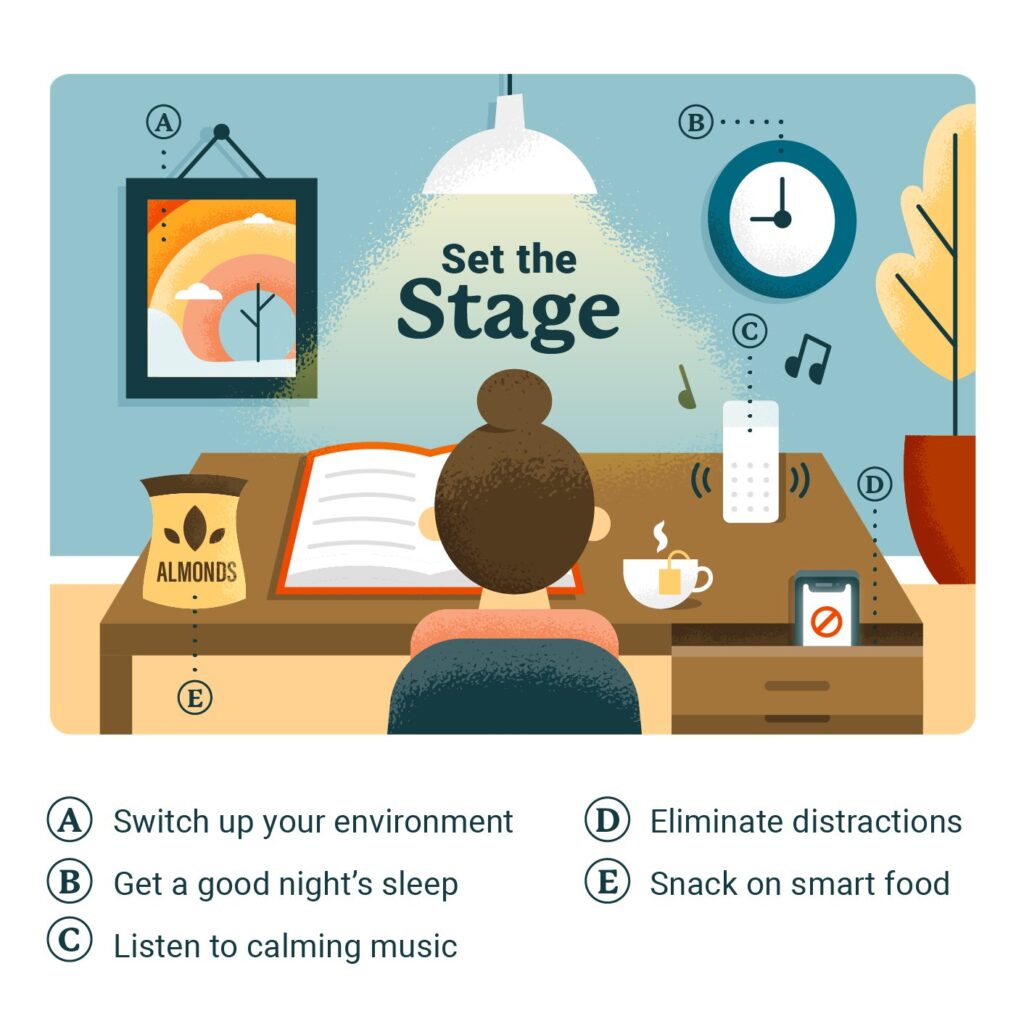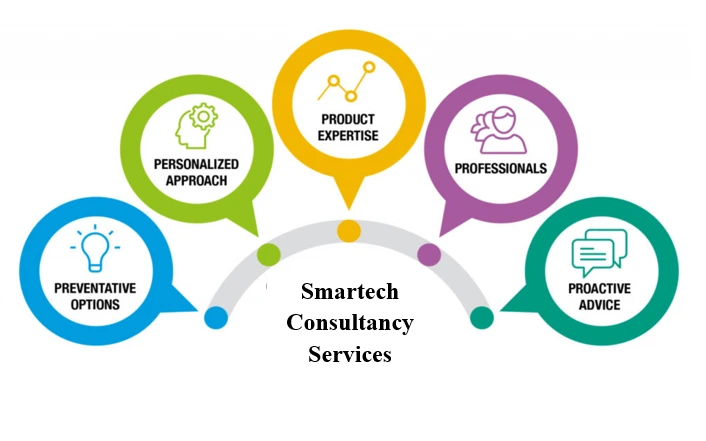Let’s face it, cramming for exams is a recipe for disaster. Imagine you’re about to embark on a thrilling road trip across the country. Would you cram everything you need – clothes, snacks, maps – into the car 5 minutes before leaving, fueled by a triple espresso? Probably not. You’d meticulously plan, pack strategically for different weather conditions, and maybe even create a killer playlist. The same logic applies to studying. Cramming throws information at your brain like a disorganized garage sale, leaving you with a jumbled mess come exam time. But fear not, fellow knowledge seekers! There’s a better way – a way to learn like a boss and ditch the stressful cramming sessions for good. Buckle up, because we’re about to explore some effective study techniques that will transform you from an overwhelmed student to a confident learner.

Conquer the Chaos: Planning Your Learning Journey
The first step to ditching the cramming scramble is planning. Think of it as building a solid foundation for your learning journey. Here are some tips:
- Craft a Study Schedule: Just like you wouldn’t set off on a road trip without a map, create a study schedule that allocates specific times for each subject. Be realistic! Factor in breaks, commitments, and your natural energy levels.
- Embrace Organization: Organize your study materials – notes, textbooks, online resources – into a system that works for you. Consider color-coding, mind maps, or digital folders. A clutter-free study space fosters a clutter-free mind.
- Set SMART Goals: Cramming thrives on vague aspirations. Instead, set SMART goals: Specific, Measurable, Achievable, Relevant, and Time-bound. Aim to learn X amount of material by Y date. This gives your studying direction and purpose.
Active Learning: Beyond Passive Reading
Cramming relies on passive reading, hoping information magically sticks after a single glance. But the human brain is an active learner. Here’s how to engage it:
- Embrace Active Recall: Don’t just reread notes or textbooks. Actively test yourself! Try writing down key concepts from memory, explaining them to an imaginary friend, or creating flashcards. This retrieval process strengthens memory and identifies areas needing more focus.
- Spaced Repetition is Your Friend: Ever notice how information learned yesterday seems blurry today? Our brains naturally forget things over time. Spaced repetition combat’s this by reviewing material at increasing intervals. Tools like Anki or Quizlet can automate this process, ensuring you revisit key concepts at optimal times for retention.
- Make Connections: Don’t study information in isolation. Actively make connections between concepts. Ask yourself “how does this relate to what I already know?”. Look for patterns, create analogies, and draw diagrams. This helps build a web of knowledge, making it easier to recall and apply information.
Mastering the Material: Techniques for Different Learning Styles
People learn best in different ways. Let’s tailor your studying to your learning style:
- Visual Learners: Visual learners thrive on seeing information. Create mind maps, use color-coded notes, watch educational videos, or draw diagrams to represent complex concepts.
- Auditory Learners: Auditory learners learn best by hearing. Record yourself explaining concepts, listen to lectures or audiobooks, or form study groups where you can actively discuss the material.
- Kinesthetic Learners: These learners crave hands-on experiences. Try using simulations, building models, role-playing scenarios, or even rewriting information in your own words.
Beyond the Textbook: Expanding Your Learning Arsenal
Textbooks are a valuable resource, but they’re not the only game in town. Explore different avenues to solidify your understanding:
- Embrace Online Resources: The internet is a treasure trove of educational resources. Look for educational videos, interactive quizzes, or websites that offer in-depth explanations. Khan Academy, Crash Course, and MIT OpenCourseware are fantastic starting points.
- Practice Makes Perfect: Don’t underestimate the power of practice tests. Many resources offer practice tests that mimic actual exams. Taking them under timed conditions helps identify weaknesses, boost test-taking confidence, and familiarize you with questions.
The Power of Breaks: Recharging for Optimal Learning

Cramming often leads to burnout. Our brains, like any muscle, need rest to function optimally. Here’s why breaks are crucial:
- Boost Memory Consolidation: When you study, you’re creating new neural pathways. Breaks allow your brain to solidify these connections, enhancing memory retention. Think of it like letting concrete dry before adding another layer.
- Enhanced Focus: Constant information overload leads to fatigue and decreased focus. Short breaks refresh your mind and allow you to return to studying with renewed energy.
- Improved Creativity: Taking breaks allows your mind to wander, which can spark creativity and help you approach problems from a new angle. A brisk walk or some light doodling can do wonders for problem-solving abilities.
Embrace the Power of “No”: Prioritization and Time Management
Cramming often stems from procrastination and poor time management. Here’s how to become a master of your time:
- Prioritize ruthlessly: Not all tasks are created equal. Learn to prioritize the most important tasks first and schedule them during your peak productivity hours.
- Beware of Multitasking: Multitasking is a myth. Your brain can only truly focus on one thing at a time. When studying, eliminate distractions like social media or close unnecessary browser tabs.
- The “Pomodoro Technique”: Try the Pomodoro Technique. This involves working in focused 25-minute intervals with short breaks in between. This method promotes sustained focus and prevents burnout.
Sleep: The Unsung Hero of Learning
Cramming often sacrifices sleep at the altar of last-minute memorization. However, sleep plays a critical role in learning and memory consolidation. Here’s why:
- Memory Consolidation Champion: During sleep, your brain processes and consolidates information learned throughout the day. Adequate sleep strengthens neural pathways, making information easier to recall later.
- Enhanced Focus and Concentration: Skimping on sleep leads to grogginess and difficulty focusing. A well-rested brain is better equipped to absorb and retain information.
- Stress Reduction: Cramming fuels stress, which can impair memory and learning. Sleep acts as a natural stress reliever, promoting better cognitive function.
Create a Study Sanctuary: Optimizing Your Environment
Cramming often happens in chaotic environments filled with distractions. Optimize your study space for maximum focus:

- Find Your Focus Zone: Choose a quiet, well-lit space conducive to concentration. Minimize clutter and personalize your space with calming elements like plants or inspirational quotes.
- Minimize Distractions: Turn off notifications on your phone and silence social media apps. Consider using website blockers if necessary.
- Embrace the Power of Music: Studies show certain types of music, like classical or nature sounds, can enhance focus and concentration. Experiment and find what works best for you.
Fuel Your Brain for Success: Nutrition and Hydration
Cramming often involves unhealthy snacks and sugary drinks as a quick energy fix. However, what you eat and drink significantly impacts your learning:
- Brain Food Powerhouse: Feed your brain with nutrient-rich foods like fruits, vegetables, whole grains, and lean protein. These foods provide sustained energy and support cognitive function.
- Stay Hydrated: Dehydration can impair memory and focus. Keep a reusable water bottle handy and sip throughout the day to stay hydrated and alert.
- Limit Sugary Treats: Sugary snacks may provide a temporary energy boost, but they lead to crashes and decreased concentration later. Opt for healthier snacks that release energy slowly.
Embrace a Growth Mindset: Learning is a Journey
Cramming often stems from a fixed mindset – the belief that intelligence is predetermined. However, a growth mindset views intelligence as something that can be developed through effort and learning. Here’s how to cultivate a growth mindset:
- Challenge Yourself: Don’t shy away from difficult concepts. View them as opportunities to grow and learn. Embrace challenges as stepping stones to mastery.
- Celebrate Mistakes: Mistakes are inevitable, but they’re also valuable learning opportunities. Analyze your mistakes, learn from them, and move on.
- Embrace the Learning Process: Focus on the joy of learning, not just the end goal of a good grade. Take pride in the progress you make and celebrate your achievements along the way.
Collaboration is Key: Study Groups and Tutoring
Cramming often feels like a solitary struggle. However, learning can be a collaborative process. Explore these options:
- The Power of Study Groups: Forming a study group with classmates can be immensely beneficial. You can quiz each other, discuss complex topics, and share different perspectives. It can also boost motivation and accountability.
- Seek Help When Needed: Don’t be afraid to seek help from tutors or professors. They can clarify doubts, provide additional resources, and offer personalized guidance, making your learning journey smoother.
De-Stress and Recharge: Maintaining Wellbeing
Cramming is a recipe for stress. Prioritize your well-being to maximize your learning potential:
- Embrace Relaxation Techniques: Incorporate stress-relieving activities like yoga, meditation, or deep breathing exercises into your routine.
- Get Moving: Regular physical activity is a natural stress reliever and boosts cognitive function. Take a brisk walk, go for a run, or hit the gym to clear your head and improve focus.
- Maintain a Healthy Social Life: Don’t neglect your social life in the pursuit of good grades. Spending time with loved ones provides emotional support and reduces stress.
Read Also
- The Ultimate Guide to Choosing the Perfect Smartphone
- “The Law of Attraction” by N.M. Silber
- The Ultimate Guide to Building Your Own PC
- What Does an IQ Test Actually Measure?
Conclusion: Ditch the Cramming, Embrace Effective Learning
Cramming might offer a temporary illusion of control, but it’s ultimately an unsustainable and ineffective approach to learning. By implementing these effective study techniques, you’ll transform from a stressed-out crammer into a confident learner ready to conquer any academic challenge. Remember, learning is a journey, not a destination. Embrace the process, celebrate your progress, and enjoy the satisfaction of mastering new knowledge.
FAQs
1. I don’t have a lot of time to study. Can these techniques still help?
Absolutely! The beauty of these techniques is their efficiency. By focusing on active learning, spaced repetition, and prioritizing tasks, you can maximize your learning output even with limited time. Techniques like the Pomodoro Technique can help you break down studying into manageable chunks.
2. What if I’m a terrible test taker?
Many effective study techniques target not just information retention but also test-taking skills. Practice tests and spaced repetition can familiarize you with exam formats and question styles. Additionally, focusing on understanding concepts instead of rote memorization will equip you to tackle even unexpected questions.
3. I get easily distracted. How can I stay focused while studying?
Creating a designated study space free from distractions is key. Utilize website blockers, turn off notifications, and inform friends and family about your study time. Experiment with different techniques like using background noise or studying in short bursts with breaks to minimize distractions.
4. I have trouble staying motivated. What can I do?
Set SMART goals and track your progress. Seeing your accomplishments can be a powerful motivator. Additionally, reward yourself for completing study sessions or achieving milestones. Studying with a friend or group can also boost accountability and keep you motivated.
5. What are some online resources I can use to supplement my learning?
There’s a wealth of educational resources online! Khan Academy, Crash Course, and MIT OpenCourseware offer fantastic video lectures and explanations across various subjects. Educational websites and YouTube channels often delve deeper into specific topics.

